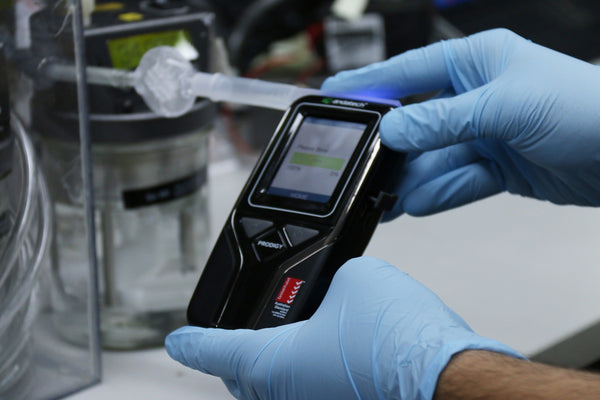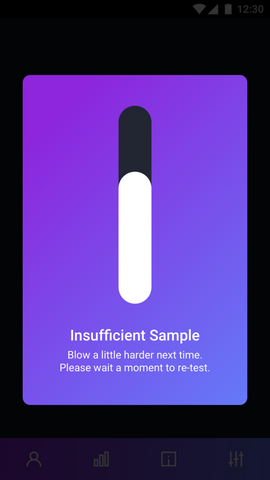Ever wondered how reliable breathalysers really are? Well, you’re in the right place! In this blog post, we dive deep into the accuracy of breathalysers, including personal breathalysers and discuss their performance in alcohol testing.
Whether you’re a frequent party-goer, casual drinker or are just curious about these alcohol testing devices, read on to know more about how breathalysers measure a user’s blood alcohol content (BAC), best practices to get the most accurate results and how they can aid in responsible drinking.
Understanding breathalysers
Whether you’ve seen them mounted on walls at bars, used by law enforcement, or considering getting a personal breathalyser, it’s essential to know the ins and outs of these alcohol testing devices.
When a person drinks alcohol, it is usually absorbed into their bloodstream before making their way into the lungs and then exhaled through their breath. Breathalysers will analyse the breath sample to estimate a subject’s BAC level.
Generally, breathalysers, especially those with certifications from Australian Standards, like Andatech and AlcoSense breathalysers, are usually always accurate and reliable, especially after being calibrated. However, there are both external and internal factors that affect the reliability and accuracy of breathalysers.
Factors affecting breathalyser accuracy
While breathalysers are designed to provide reliable BAC levels, several external and internal factors can influence their readings. For the most accurate results, it’s crucial to know these factors and avoid them.
Calibration
Like all measuring tools, consistent usage of the device can lead to sensor drift which will, in turn, force the unit to lose its accuracy over time. Calibrating your breathalyser regularly is important to maintain accuracy at all times. Andatech and AlcoSense breathalysers are to be calibrated every 12 months for best results.
All AlcoSense and Andatech breathalysers are calibrated with high levels of accuracy in the Andatech Melbourne calibration centre. Andatech and AlcoSense units that are regularly calibrated will also lead to the device gaining an extended guarantee under the Andatech Guarantee.
LEARN MORE: Andatech calibration plans

Mouth alcohol
The alcohol that a breathalyser measures should originate from deep lung breath. If there is a lot of alcohol residue left in a test subject’s mouth, it may cause a higher reading than usual because the reading will be influenced by mouth alcohol instead of breath alcohol.
Plus, if a test subject blows into the unit immediately after drinking, alcohol residue could find its way into the breathalyser and damage the unit’s sensor.
To avoid this, Andatech advises users to always wait 15-20 minutes after drinking for better results.
Foreign substances
Just like mouth alcohol, the presence of foreign substances like food and other drinks can lead to inaccurate readings. This can also be an issue if two different test subjects share the same mouthpiece. Residue or substances from the previous mouthpiece may find their way into the sensor, causing inaccurate readings and potentially sensor damage.
For best results, wait 15-20 minutes after eating or drinking and avoid sharing mouthpieces with your mates.
READ MORE: How to perform an alcohol breath test
Faulty units
If the unit has been accidentally dropped, damaged or improperly stored (in the wrong temperature or settings), the unit can suffer sensor damage, leading to inaccurate readings over time. To avoid this, do always obey manufacturer storage instructions.
For more information, check out our blog post on 5 factors affecting breathalyser accuracy.
Best practices for breathalyser tests
To maximise the accuracy of readings and make better-informed decisions regarding alcohol consumption, follow the best practices we have listed below.
Follow manufacturer instructions
Every breathalyser brand and model has different, specific instructions for optimal results. Although you may be tempted to discard the user’s manual, have a read before using your unit.
Generally, it’s best to always wait up to 20 minutes after eating, drinking or smoking before conducting your breath test and avoid foods that may offset a breathalyser, such as fermented foods and foods that may contain alcohol.
Provide a deep lung breath sample
For the most accurate results, it’s important to provide a deep lung breath sample instead of merely blowing into the unit. To do this, take a deep breath and exhale a strong and steady breath into the unit. This type of breath sample comes from the lower part of the lungs and contains the highest concentration of alcohol. An unsteady or weak breath sample can result in a flow error, where not enough breath has been deposited, causing the test to be retaken.

Avoid interference from external substances
Steer clear of products that may offset a breathalyser, causing a false reading. These include mouthwash and breath fresheners, as they may contain alcohol. If you have used mouthwash beforehand, it will help to rinse the mouth with water thoroughly to remove any residual substances before testing.
Take multiple tests
For consistency and reliability sake, it will help to take multiple tests with a short intervals between them. This will help identify any discrepancies or variations in the results, proving a more accurate assessment of the subject’s BAC levels.
Summary
Understanding the technology behind breathalysers, the factors that affect their accuracy, how to avoid them and learning the best practices surrounding alcohol testing can significantly enhance the reliability of the results.
By staying informed and in-the-know, you could be the difference between a fun night out and unnecessary trouble.
Browse our full collection of AlcoSense personal breathalysers and Andatech workplace breathalysers to help you find the right unit to suit your needs.





